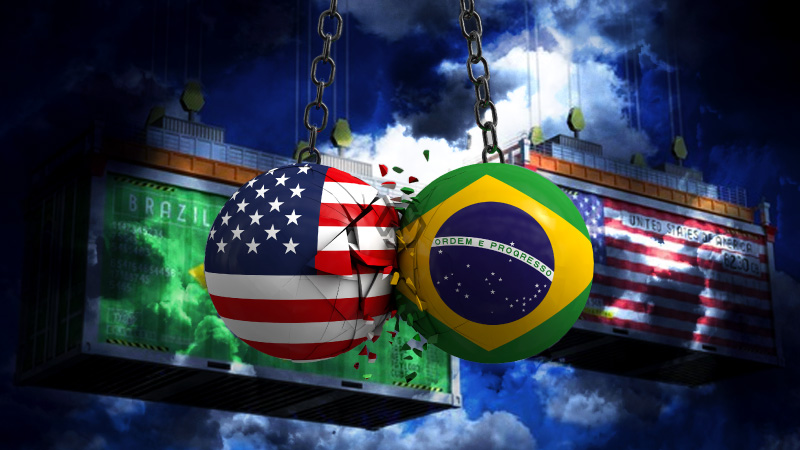- Trump imposes a sweeping 50% tariff on all Brazilian imports, citing Bolsonaro’s prosecution.
- Lula denounces the move as a threat to Brazil’s judicial independence and sovereignty.
- The escalating tension marks a new low in U.S.-Brazil relations, raising global trade concerns.
In a surprise move that sent shockwaves through diplomatic and economic circles, former U.S. President Donald Trump announced a 50% tariff on all Brazilian imports, linking the decision to Brazil’s ongoing prosecution of former President Jair Bolsonaro.
President Lula responded sharply, calling Trump’s actions “unacceptable” and warning that Brazil would not “accept tutelage” from any foreign power.
Brazil Rejects Trump’s Tariff Threat: Lula Defends Judiciary Amid Bolsonaro Tensions
The U.S. and Brazil have long shared a complex trade relationship, with Brazil being a major exporter of commodities like soybeans, iron ore, and beef to the American market. A sudden 50% tariff threatens to upend this balance, potentially sparking inflationary pressures and prompting Brazilian exporters to seek alternative markets in Asia and Europe. Economists warn that such protectionist policies, if sustained, could ripple across Latin America’s supply chains.
Beyond economics, the move has deepened political divisions within Brazil. Supporters of Bolsonaro have praised Trump’s backing, interpreting it as international validation of their claims of judicial bias. Meanwhile, Lula’s administration views the tariff as a veiled attempt to destabilize democratic institutions by fueling external pressure. The clash underscores how former leaders like Trump and Bolsonaro continue to wield influence long after leaving office.
In Washington, the move has sparked debate among policymakers, with critics accusing Trump of weaponizing tariffs for personal or ideological purposes rather than strategic national interests. Several lawmakers have called for congressional review, citing concerns over global diplomatic fallout and the undermining of long-standing trade norms.
Meanwhile, regional allies are closely watching the dispute. Mercosur nations have expressed concern over the precedent such unilateral tariffs may set, fearing a domino effect in geopolitical interference under the guise of trade enforcement. Talks are reportedly underway between Brazil and the EU to strengthen trade alliances as a counterbalance to Washington’s unpredictable stance.
Trump’s tariff decision has not only destabilized U.S.-Brazil trade relations but also exposed the fragility of international norms when political loyalty overrides diplomacy. Lula’s firm stance signals Brazil’s determination to protect its sovereignty in the face of foreign pressure.
“Sovereignty means governing ourselves, not being governed by the interests of others.” – Luiz Inácio Lula da Silva



